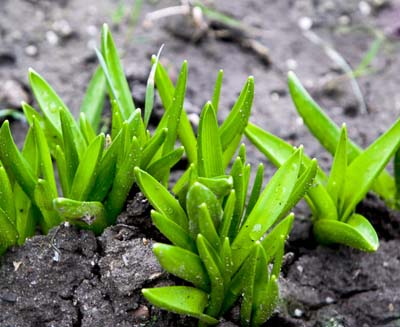Plant propagation: getting started
How to get started growing your own plants from scratch


Exquisite houses, the beauty of Nature, and how to get the most from your life, straight to your inbox.
You are now subscribed
Your newsletter sign-up was successful
Few horticultural thrills can compare to that of turning a handful of seeds into a flourishing border or creating a perfect replica of a parent plant. Homegrown specimens will, of course, take longer to get going than established ones, but the results make all the waiting worthwhile-the sight of the first tiny shoots peeping through the soil has the power to move even the most seasoned plantsman.
Propagation-growing your own plants from scratch-is a sustainable and cost-effective way of making your mark on the garden. It's also not half as tricky as it's made out to be, provided you approach it logically and with care. Nervous newcomers should take comfort from the fact that they're simply encouraging their plants to do what comes naturally. There's no need to splash out on masses of up-to-the-minute kit, either. Heated propagators make a welcome addition to any grower's arsenal, but a warm windowsill will often work just as well. With a few tweaks, your existing set-up should rise to the occasion admirably. EH
Getting started
It goes without saying that the Royal Horticultural Society (RHS) should be your first port of call. It runs propagation courses at its garden in Wisley, Surrey, for beginners (there's one on March 5), plus one-day workshops aimed at those with some horticultural knowledge. Topics covered in the latter include shrub and bulb propagation, hardwood and root cuttings and division. You can then move on to part-time professional qualifications in practical horticulture-(0845 612 1253; www.rhs.org.uk/Courses/Qualifications).
Hadlow College (01732 850551; www.hadlow.ac.uk) offers part-time propagation courses at four of its five Kent campuses, priced at £80 and with various start dates. Students spend one day each week immersed in every aspect of growing from seed and can take the results home with them.
If you have (or are thinking of establishing) a cut-flower garden and are keen to learn the secrets of propagating annuals, perennials and shrubs for cutting, head for Wealden Flowers (www.wealdenflowers.co.uk), an organic cut-flower farm in East Sussex.
A one-day introductory course costs £102. Over in Northiam, near Rye, you can join Great Dixter's nursery manager Michael Morphy on April 7 or September 15 for a propagation masterclass (01797 252878; www.greatdixter.co.uk). The day costs £125 per person including lunch, and you'll get a 10% discount on all plant purchases from the nursery.
Exquisite houses, the beauty of Nature, and how to get the most from your life, straight to your inbox.
West Yorkshire-based garden consultants Those Plant People (07525 379565; www.thoseplantpeople.com) have a half-day propagation workshop coming up on January 25, costing £25. Their enthusiasm for collecting seeds is infectious, and attendees will be able to select plants from the grounds of Fern Cottage to work with.

Give it a try
Essex's Writtle College (01245 424286; www.writtle.ac.uk) organises one-day practical courses in propagation that cover growing from seed, taking cuttings (softwood, semi-ripe, root and leaf) and division. Afterwards, you'll take your seed trays and prepared cuttings home with you. The day costs £77 and the next one is on March 29.
What to buy
RHS-endorsed dibber, £14.95, Burgon & Ball (0114-233 8262; www.burgonandball.com)
Darlac wooden-handled budding knife, £9.25, Two Wests & Elliott (01246 451077; www.twowests.co.uk)
Two-in-one garden sieve, £11.99, Suttons Seeds (0844 922 0606; www.suttons.co.uk)
‘Fine As Rain' No 19 oval all-brass rose, (cans available separately), £11.99, Haws Watering Cans (01214 202494; www.haws.co.uk)
Copper tags, £4.95 for 10, Burgon & Ball (www.burgonandball.com; 0114-233 8262)
Make a weekend of it
Burton Agnes Hall, Driffield, East Yorkshire
The annual plant fair here has a devoted following and the walled garden is home to more than 4,000 different cultivars, plus there's the Jungle Garden and the National Collection of campanulas. After tea in the Courtyard Café, head for Dowthorpe Hall (www.dowthorpehall.com), a Georgian family home turned B&B with delightful gardens. From £50 per person per night, including breakfast. (01262 490324; www.burtonagnes.com) RHS Rosemoor, Great Torrington, Devon
This West Country gem runs popular propagation work-shops, but taking a stroll around the gardens is just as inspiring. Stay in one of three self-catering apartments, each of which offers garden access once the gates have closed to the public. Guests can book personalised tours of the grounds (£30 per person) and order a locally sourced breakfast pack (£20). From £249 for a three-night stay. (01805 626810; www.rhs.org.uk/garden/rosemoor)
Tips from the expert
Troy Scott Smith, head gardener at Sissinghurst Castle (01580 710700; www.nationaltrust.org.uk/sissinghurst-castle), which hosts propagation workshops, provides essential information
* When splitting perennials, replant the mother plant straight away once division is completed to prevent its root system drying out. It's essential that divisions are never allowed to become damaged from getting dry * Variegated plants will not come true from root cuttings-they will always revert to green leaves. Never remove more than a third of root material from the parent plant if you wish to replant it * When taking leaf cuttings, make sure you select material from the parent plant that's clean, free from pests or disease and is not in flower
Read all about it
The Royal Horticultural Society Propagating Plants Ed Alan Toogood (Dorling Kindersley, £18.99)
Grow Your Own Garden: How To Propagate All Your Own Plants Carol Klein (BBC Books, £20)
The Gardener's Guide to Propagation Richard Rosenfeld (Lorenz Books, £16.99)
Country Life is unlike any other magazine: the only glossy weekly on the newsstand and the only magazine that has been guest-edited by His Majesty The King not once, but twice. It is a celebration of modern rural life and all its diverse joys and pleasures — that was first published in Queen Victoria's Diamond Jubilee year. Our eclectic mixture of witty and informative content — from the most up-to-date property news and commentary and a coveted glimpse inside some of the UK's best houses and gardens, to gardening, the arts and interior design, written by experts in their field — still cannot be found in print or online, anywhere else.
